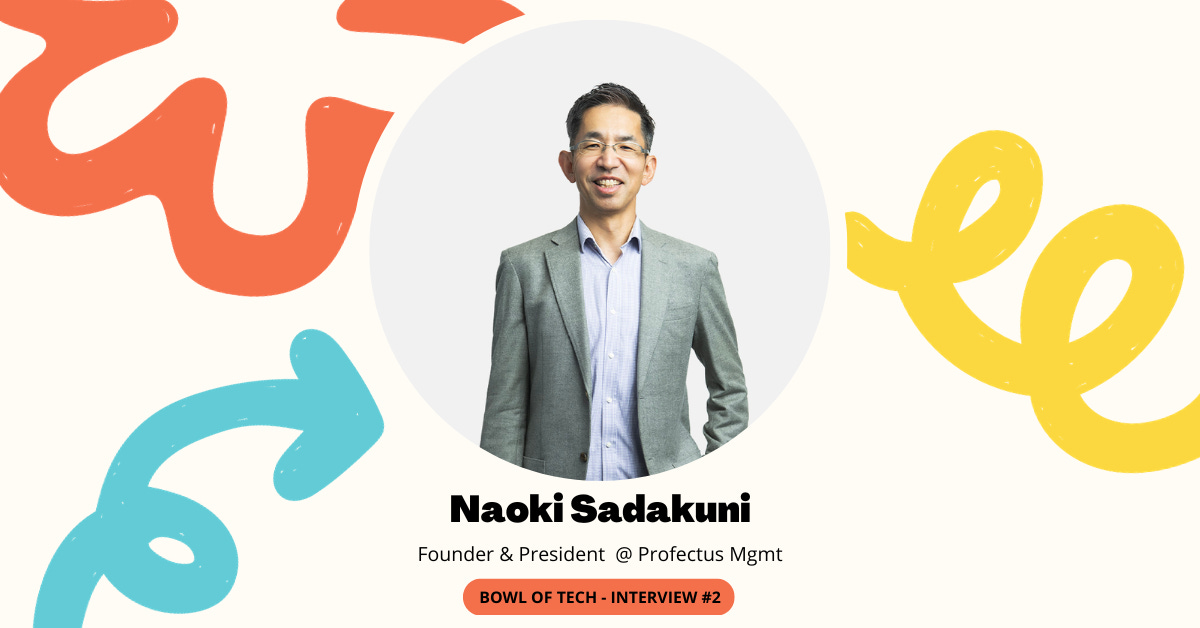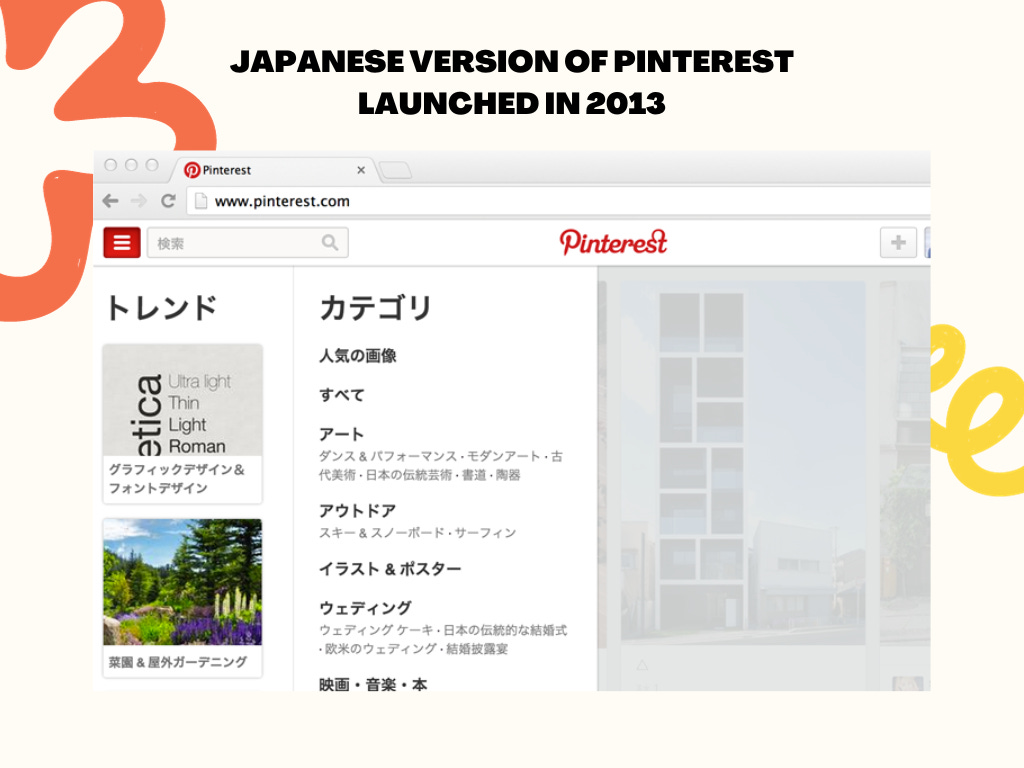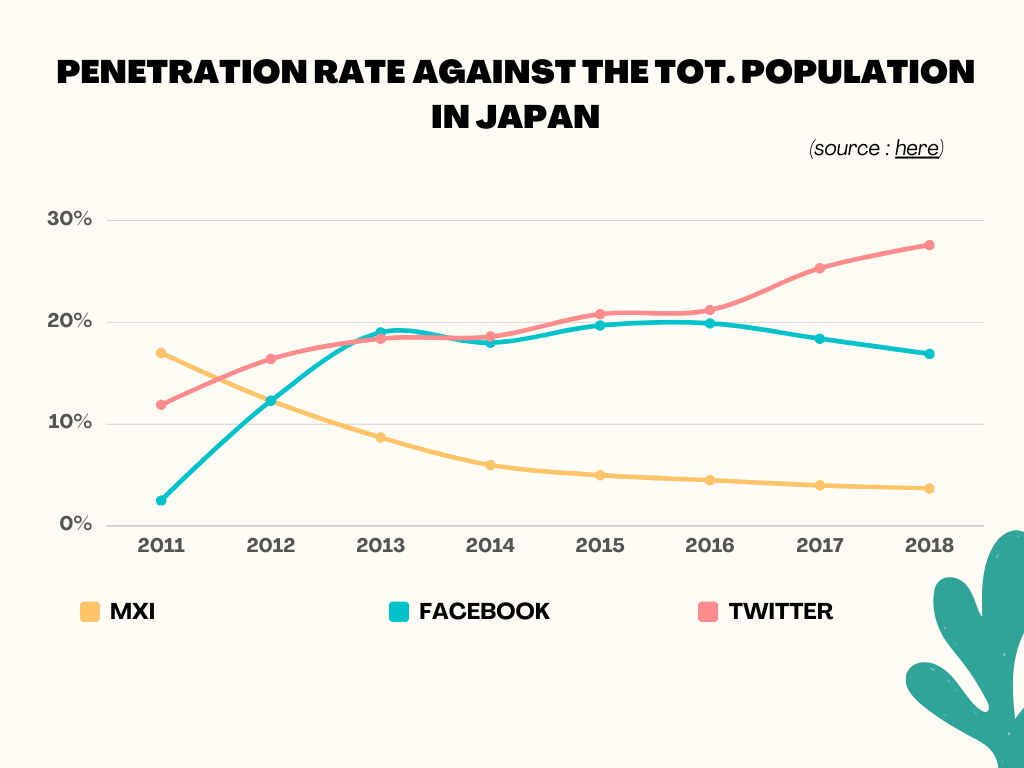🎙️Navigating Silicon Valley, Japanese culture, and continuous learning | Naoki Sadakuni, Founder & President at Profectus Mgmt
bowl of tech - interview #2
Hello 👋 ! In September, I was super excited to interview one of the most soft-spoken leaders I know, Ayumi Nakajima.
Continuing along the same path of highlighting inspiring leaders who also deserve recognition beyond the APAC region, I'm thrilled to share my discussion with Naoki Sadakuni.
Naoki Sadakuni is one of the fearless leader I really look up to. He's been a big inspiration to me in my professional journey. This is not because of his incredibly diverse background, which includes starting as an engineer and then taking on pivotal business leadership roles at Google, Square or Pinterest. Now, as the founder & president at Profectus Mgmt, he's actively contributing to the growth of tech companies in Japan 🇯🇵.
But what impresses me the most is his constant drive to learn new things. He's not only a role model in terms of hard work and achievements but also in terms of his relentless pursuit of growth.
Where to find Naoki Sadakuni: LinkedIn
Q: You've worn many hats in the tech industry, from software engineer to country manager. What's the most unexpected skill or lesson you've picked up along the way that's been surprisingly useful?
There were a lot of skills which were unexpectedly useful. One of the examples is that I found the software programming skill turned out to be “unexpectedly” useful. It must sound funny because I was a software engineer. (Yes, it was of course useful when I was an engineer 😅.) The thing is that I didn’t expect it could be useful when I switched my career from the engineering path to the business one. For example, the experience to logically design software architecture helped me structure business communications. I found there were some commonalities between how to design the software and how to structure business documentations (e.g. in high level, the both need to be logically hierarchical).
Anyway, this was just one of many examples. What I’d like to emphasize is that there is almost no skill or job experience which is not useful at all as long as we work hard with those. Here is another example. When I worked for Square, I did some walk-in sales in some shopping districts before officially launching the product in Japan. I have to admit that it wasn’t fun, rather painful since I was often kicked out by many store owners (and I learned I had no sales talent). But, it helped me learn how important it is to understand customer’s needs and pain points and it became useful for my work later.
I think we can’t perfectly expect and imagine what are the useful skills or experiences along the way. The only thing we could do is to do the best on what we need to do today. The experience we have today might be useful for us 10 years later. Who knows.
Q: Working at Google, Square, and Pinterest must have been quite the ride. Can you tell us about one pivotal moment or decision that shaped your journey at these Silicon Valley giants?
The lesson I learned was the importance of the definition of the scope of work with clear priorities.
When I worked for Square Japan, I joined the company when the country team was established, and I became one of the co-country leads. I had no general management experience before then. There were tons of things to execute the product launch in 6 months from scratch in the country. I worked so hard day and night and seven days a week without much sleep. I tried to do as much work as possible since I thought it was the right thing to do as a startup team. But, a single person’s efforts never scaled. I finally lost my health and quit my job.
The lesson was that the general manager has to understand the issues first, prioritize them, and focus on the important work. It’s critically important to decide what we don’t do. At a startup company, there are tons of things which seem to be important to do. But we have to understand that a startup company can’t do as an enterprise company does. Focus only on important work and do it really really well.
Q: With your background in consulting and tech leadership, you've likely encountered various leadership styles. Can you describe a mentor or leader who left a lasting impression on you, and what specific qualities made them stand out?
I fortunately have mentors and leaders whom I admire. The commonality among them is that they have outstanding people skills even though their personalities are very different. Some of them were tough managers, but at the bottom line, they care about people. At the end of the day, a good leader must be the person whom people can trust and respect. The titles or technical skills don’t help in the long term.
Q: Japan has a rich history of innovation, yet it's often seen as a challenging market for foreign tech companies.
Can you share a story of a time when you saw an international tech company successfully adapt and thrive in Japan? What cultural nuances do you believe were crucial to making it work?
This is a very good question. In fact, lots of Japanese business people emphasize that Japan is so unique, or Japan is very different from other countries. It is actually true in many regards but I often disagree with this.
The fundamental issues or problems we’re trying to solve through services and/or products in Japan must be the same with the ones in other countries. There is no difference in a macro view. It doesn't mean that we should ignore cultural differences though. There isn’t a simple answer but we have to figure out what we adapt and what we ignore.
For example, the Pinterest app worked in Japan without changing any function even though many Japanese journalists or industry specialists donut about it at the beginning. On the other hand, we found that the user growth strategy which worked in Japan was different from the one in the US. For example, the alpha bloggers had a huge influence to generate word of mouth to make Pinterest popular in the US, but it was not the case in Japan.
Another famous example in Japan is that so many people including IT experts said, “a social networking service which requires users’ real names never works in Japan” when Facebook was launched there. At that time, there was a domestic service called Mixi which allowed the users to use their nicknames and dominated the market at that time. But in a few years, Facebook became standard and Mixi became obsolete even though Facebook didn’t change its function.
On the other hand, as far as I’ve heard, their business operation in Japan was different from those in other countries, especially in the early stages.
You might have heard of the proverb “think globally and act locally”. I guess the things around the products/services should be considered with the global perspectives while the strategy and business operations need to be designed with the local insights. This is not necessarily true all the time, but I found it often true in many cases.
Q: As someone deeply familiar with both Japanese and Silicon Valley cultures, what do you see as the most significant cultural differences in how businesses operate, and how can companies leverage these differences to their advantage?
The way companies and organizations operate is very different between the two. As far as I observed, Silicon Valley culture is more or less “we don’t know unless we do” mindset. It not only generates innovations but also tolerates mistakes and errors as far as we learn from those. In contrast, Japanese culture is like “we do what other people do”. It helps a lot when controlling the quality of mass produced products simply because the standard of the workers tends to become consistent. The weakness of each of the two is just opposite.
In a macro view, AI technology and robotics technology will do many of the standardized or rule based work. To survive in the tough business world in the future, we have to do something which AI or robotics is not good at. Unfortunately, I don’t think the current Japanese style doesn’t go well in this view, and the country has to change.
Q: Many individuals face imposter syndrome, especially in high-stakes industries like tech. How do you overcome self-doubt and maintain confidence in your abilities as a leader?
I know the things I could (or can) do well are quite limited. I hopped from a role to a role (an engineer, consultant, marketer, etc). There was no way for me to stand out in any of the specialized areas. I simply loved what I was doing and enjoyed working with the talented people. In this environment, I was able to learn so much from the people and work. I think there is some correlation between confidence and happiness.
Having said that, to answer your question, I think there were two important things:
One was that I tried to make real impacts in the area where I can do well. To do so, I needed to understand my strengths and weaknesses. In the business environment (unlike personal communities), it’s inevitable that you have to deliver something which many other people can’t do, otherwise your value becomes diminished. This is the reality whether you like it or not.
The other was that I relied on talented people who could do well what I couldn’t do. The good news is that we don’t have to be perfect business people. But, it was critically important for me to build the team with the people who were better than me.
Q: In today's globalized tech landscape, what advice would you give to young professionals looking to forge a successful career path in this industry, considering your own diverse journey?
As mentioned above, first, do your best at what you need to do today. It will help you in the future. The titles especially in the early career stage don't mean anything at all. Second, work with good and smart people and learn from them.
If you’ve learnt anything new today, show some love by tapping the 🧡 icon or by sharing it.






